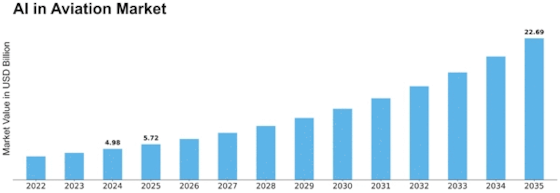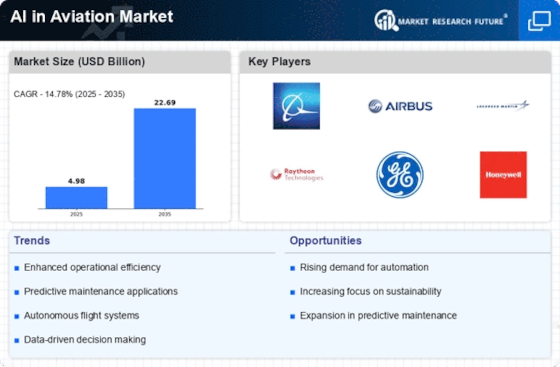Flight Operations
Predictive Maintenance
Air Traffic Management
Passenger Experience
Cloud
On-Premises
Hardware
Software
Services
Commercial Aviation
Military Aviation
General Aviation
North America
Europe
South America
Asia Pacific
Middle East and Africa
North America Outlook (USD Billion, 2019-2032)
North America AI in Aviation Market by Application Type
Flight Operations
Predictive Maintenance
Air Traffic Management
Passenger Experience
North America AI in Aviation Market by Deployment Mode Type
Cloud
On-Premises
North America AI in Aviation Market by Component Type
Hardware
Software
Services
North America AI in Aviation Market by End Use Type
Commercial Aviation
Military Aviation
General Aviation
North America AI in Aviation Market by Regional Type
US
Canada
US Outlook (USD Billion, 2019-2032)
US AI in Aviation Market by Application Type
Flight Operations
Predictive Maintenance
Air Traffic Management
Passenger Experience
US AI in Aviation Market by Deployment Mode Type
Cloud
On-Premises
US AI in Aviation Market by Component Type
Hardware
Software
Services
US AI in Aviation Market by End Use Type
Commercial Aviation
Military Aviation
General Aviation
CANADA Outlook (USD Billion, 2019-2032)
CANADA AI in Aviation Market by Application Type
Flight Operations
Predictive Maintenance
Air Traffic Management
Passenger Experience
CANADA AI in Aviation Market by Deployment Mode Type
Cloud
On-Premises
CANADA AI in Aviation Market by Component Type
Hardware
Software
Services
CANADA AI in Aviation Market by End Use Type
Commercial Aviation
Military Aviation
General Aviation
Europe Outlook (USD Billion, 2019-2032)
Europe AI in Aviation Market by Application Type
Flight Operations
Predictive Maintenance
Air Traffic Management
Passenger Experience
Europe AI in Aviation Market by Deployment Mode Type
Cloud
On-Premises
Europe AI in Aviation Market by Component Type
Hardware
Software
Services
Europe AI in Aviation Market by End Use Type
Commercial Aviation
Military Aviation
General Aviation
Europe AI in Aviation Market by Regional Type
Germany
UK
France
Russia
Italy
Spain
Rest of Europe
GERMANY Outlook (USD Billion, 2019-2032)
GERMANY AI in Aviation Market by Application Type
Flight Operations
Predictive Maintenance
Air Traffic Management
Passenger Experience
GERMANY AI in Aviation Market by Deployment Mode Type
Cloud
On-Premises
GERMANY AI in Aviation Market by Component Type
Hardware
Software
Services
GERMANY AI in Aviation Market by End Use Type
Commercial Aviation
Military Aviation
General Aviation
UK Outlook (USD Billion, 2019-2032)
UK AI in Aviation Market by Application Type
Flight Operations
Predictive Maintenance
Air Traffic Management
Passenger Experience
UK AI in Aviation Market by Deployment Mode Type
Cloud
On-Premises
UK AI in Aviation Market by Component Type
Hardware
Software
Services
UK AI in Aviation Market by End Use Type
Commercial Aviation
Military Aviation
General Aviation
FRANCE Outlook (USD Billion, 2019-2032)
FRANCE AI in Aviation Market by Application Type
Flight Operations
Predictive Maintenance
Air Traffic Management
Passenger Experience
FRANCE AI in Aviation Market by Deployment Mode Type
Cloud
On-Premises
FRANCE AI in Aviation Market by Component Type
Hardware
Software
Services
FRANCE AI in Aviation Market by End Use Type
Commercial Aviation
Military Aviation
General Aviation
RUSSIA Outlook (USD Billion, 2019-2032)
RUSSIA AI in Aviation Market by Application Type
Flight Operations
Predictive Maintenance
Air Traffic Management
Passenger Experience
RUSSIA AI in Aviation Market by Deployment Mode Type
Cloud
On-Premises
RUSSIA AI in Aviation Market by Component Type
Hardware
Software
Services
RUSSIA AI in Aviation Market by End Use Type
Commercial Aviation
Military Aviation
General Aviation
ITALY Outlook (USD Billion, 2019-2032)
ITALY AI in Aviation Market by Application Type
Flight Operations
Predictive Maintenance
Air Traffic Management
Passenger Experience
ITALY AI in Aviation Market by Deployment Mode Type
Cloud
On-Premises
ITALY AI in Aviation Market by Component Type
Hardware
Software
Services
ITALY AI in Aviation Market by End Use Type
Commercial Aviation
Military Aviation
General Aviation
SPAIN Outlook (USD Billion, 2019-2032)
SPAIN AI in Aviation Market by Application Type
Flight Operations
Predictive Maintenance
Air Traffic Management
Passenger Experience
SPAIN AI in Aviation Market by Deployment Mode Type
Cloud
On-Premises
SPAIN AI in Aviation Market by Component Type
Hardware
Software
Services
SPAIN AI in Aviation Market by End Use Type
Commercial Aviation
Military Aviation
General Aviation
REST OF EUROPE Outlook (USD Billion, 2019-2032)
REST OF EUROPE AI in Aviation Market by Application Type
Flight Operations
Predictive Maintenance
Air Traffic Management
Passenger Experience
REST OF EUROPE AI in Aviation Market by Deployment Mode Type
Cloud
On-Premises
REST OF EUROPE AI in Aviation Market by Component Type
Hardware
Software
Services
REST OF EUROPE AI in Aviation Market by End Use Type
Commercial Aviation
Military Aviation
General Aviation
APAC Outlook (USD Billion, 2019-2032)
APAC AI in Aviation Market by Application Type
Flight Operations
Predictive Maintenance
Air Traffic Management
Passenger Experience
APAC AI in Aviation Market by Deployment Mode Type
Cloud
On-Premises
APAC AI in Aviation Market by Component Type
Hardware
Software
Services
APAC AI in Aviation Market by End Use Type
Commercial Aviation
Military Aviation
General Aviation
APAC AI in Aviation Market by Regional Type
China
India
Japan
South Korea
Malaysia
Thailand
Indonesia
Rest of APAC
CHINA Outlook (USD Billion, 2019-2032)
CHINA AI in Aviation Market by Application Type
Flight Operations
Predictive Maintenance
Air Traffic Management
Passenger Experience
CHINA AI in Aviation Market by Deployment Mode Type
Cloud
On-Premises
CHINA AI in Aviation Market by Component Type
Hardware
Software
Services
CHINA AI in Aviation Market by End Use Type
Commercial Aviation
Military Aviation
General Aviation
INDIA Outlook (USD Billion, 2019-2032)
INDIA AI in Aviation Market by Application Type
Flight Operations
Predictive Maintenance
Air Traffic Management
Passenger Experience
INDIA AI in Aviation Market by Deployment Mode Type
Cloud
On-Premises
INDIA AI in Aviation Market by Component Type
Hardware
Software
Services
INDIA AI in Aviation Market by End Use Type
Commercial Aviation
Military Aviation
General Aviation
JAPAN Outlook (USD Billion, 2019-2032)
JAPAN AI in Aviation Market by Application Type
Flight Operations
Predictive Maintenance
Air Traffic Management
Passenger Experience
JAPAN AI in Aviation Market by Deployment Mode Type
Cloud
On-Premises
JAPAN AI in Aviation Market by Component Type
Hardware
Software
Services
JAPAN AI in Aviation Market by End Use Type
Commercial Aviation
Military Aviation
General Aviation
SOUTH KOREA Outlook (USD Billion, 2019-2032)
SOUTH KOREA AI in Aviation Market by Application Type
Flight Operations
Predictive Maintenance
Air Traffic Management
Passenger Experience
SOUTH KOREA AI in Aviation Market by Deployment Mode Type
Cloud
On-Premises
SOUTH KOREA AI in Aviation Market by Component Type
Hardware
Software
Services
SOUTH KOREA AI in Aviation Market by End Use Type
Commercial Aviation
Military Aviation
General Aviation
MALAYSIA Outlook (USD Billion, 2019-2032)
MALAYSIA AI in Aviation Market by Application Type
Flight Operations
Predictive Maintenance
Air Traffic Management
Passenger Experience
MALAYSIA AI in Aviation Market by Deployment Mode Type
Cloud
On-Premises
MALAYSIA AI in Aviation Market by Component Type
Hardware
Software
Services
MALAYSIA AI in Aviation Market by End Use Type
Commercial Aviation
Military Aviation
General Aviation
THAILAND Outlook (USD Billion, 2019-2032)
THAILAND AI in Aviation Market by Application Type
Flight Operations
Predictive Maintenance
Air Traffic Management
Passenger Experience
THAILAND AI in Aviation Market by Deployment Mode Type
Cloud
On-Premises
THAILAND AI in Aviation Market by Component Type
Hardware
Software
Services
THAILAND AI in Aviation Market by End Use Type
Commercial Aviation
Military Aviation
General Aviation
INDONESIA Outlook (USD Billion, 2019-2032)
INDONESIA AI in Aviation Market by Application Type
Flight Operations
Predictive Maintenance
Air Traffic Management
Passenger Experience
INDONESIA AI in Aviation Market by Deployment Mode Type
Cloud
On-Premises
INDONESIA AI in Aviation Market by Component Type
Hardware
Software
Services
INDONESIA AI in Aviation Market by End Use Type
Commercial Aviation
Military Aviation
General Aviation
REST OF APAC Outlook (USD Billion, 2019-2032)
REST OF APAC AI in Aviation Market by Application Type
Flight Operations
Predictive Maintenance
Air Traffic Management
Passenger Experience
REST OF APAC AI in Aviation Market by Deployment Mode Type
Cloud
On-Premises
REST OF APAC AI in Aviation Market by Component Type
Hardware
Software
Services
REST OF APAC AI in Aviation Market by End Use Type
Commercial Aviation
Military Aviation
General Aviation
South America Outlook (USD Billion, 2019-2032)
South America AI in Aviation Market by Application Type
Flight Operations
Predictive Maintenance
Air Traffic Management
Passenger Experience
South America AI in Aviation Market by Deployment Mode Type
Cloud
On-Premises
South America AI in Aviation Market by Component Type
Hardware
Software
Services
South America AI in Aviation Market by End Use Type
Commercial Aviation
Military Aviation
General Aviation
South America AI in Aviation Market by Regional Type
Brazil
Mexico
Argentina
Rest of South America
BRAZIL Outlook (USD Billion, 2019-2032)
BRAZIL AI in Aviation Market by Application Type
Flight Operations
Predictive Maintenance
Air Traffic Management
Passenger Experience
BRAZIL AI in Aviation Market by Deployment Mode Type
Cloud
On-Premises
BRAZIL AI in Aviation Market by Component Type
Hardware
Software
Services
BRAZIL AI in Aviation Market by End Use Type
Commercial Aviation
Military Aviation
General Aviation
MEXICO Outlook (USD Billion, 2019-2032)
MEXICO AI in Aviation Market by Application Type
Flight Operations
Predictive Maintenance
Air Traffic Management
Passenger Experience
MEXICO AI in Aviation Market by Deployment Mode Type
Cloud
On-Premises
MEXICO AI in Aviation Market by Component Type
Hardware
Software
Services
MEXICO AI in Aviation Market by End Use Type
Commercial Aviation
Military Aviation
General Aviation
ARGENTINA Outlook (USD Billion, 2019-2032)
ARGENTINA AI in Aviation Market by Application Type
Flight Operations
Predictive Maintenance
Air Traffic Management
Passenger Experience
ARGENTINA AI in Aviation Market by Deployment Mode Type
Cloud
On-Premises
ARGENTINA AI in Aviation Market by Component Type
Hardware
Software
Services
ARGENTINA AI in Aviation Market by End Use Type
Commercial Aviation
Military Aviation
General Aviation
REST OF SOUTH AMERICA Outlook (USD Billion, 2019-2032)
REST OF SOUTH AMERICA AI in Aviation Market by Application Type
Flight Operations
Predictive Maintenance
Air Traffic Management
Passenger Experience
REST OF SOUTH AMERICA AI in Aviation Market by Deployment Mode Type
Cloud
On-Premises
REST OF SOUTH AMERICA AI in Aviation Market by Component Type
Hardware
Software
Services
REST OF SOUTH AMERICA AI in Aviation Market by End Use Type
Commercial Aviation
Military Aviation
General Aviation
MEA Outlook (USD Billion, 2019-2032)
MEA AI in Aviation Market by Application Type
Flight Operations
Predictive Maintenance
Air Traffic Management
Passenger Experience
MEA AI in Aviation Market by Deployment Mode Type
Cloud
On-Premises
MEA AI in Aviation Market by Component Type
Hardware
Software
Services
MEA AI in Aviation Market by End Use Type
Commercial Aviation
Military Aviation
General Aviation
MEA AI in Aviation Market by Regional Type
GCC Countries
South Africa
Rest of MEA
GCC COUNTRIES Outlook (USD Billion, 2019-2032)
GCC COUNTRIES AI in Aviation Market by Application Type
Flight Operations
Predictive Maintenance
Air Traffic Management
Passenger Experience
GCC COUNTRIES AI in Aviation Market by Deployment Mode Type
Cloud
On-Premises
GCC COUNTRIES AI in Aviation Market by Component Type
Hardware
Software
Services
GCC COUNTRIES AI in Aviation Market by End Use Type
Commercial Aviation
Military Aviation
General Aviation
SOUTH AFRICA Outlook (USD Billion, 2019-2032)
SOUTH AFRICA AI in Aviation Market by Application Type
Flight Operations
Predictive Maintenance
Air Traffic Management
Passenger Experience
SOUTH AFRICA AI in Aviation Market by Deployment Mode Type
Cloud
On-Premises
SOUTH AFRICA AI in Aviation Market by Component Type
Hardware
Software
Services
SOUTH AFRICA AI in Aviation Market by End Use Type
Commercial Aviation
Military Aviation
General Aviation
REST OF MEA Outlook (USD Billion, 2019-2032)
REST OF MEA AI in Aviation Market by Application Type
Flight Operations
Predictive Maintenance
Air Traffic Management
Passenger Experience
REST OF MEA AI in Aviation Market by Deployment Mode Type
Cloud
On-Premises
REST OF MEA AI in Aviation Market by Component Type
Hardware
Software
Services
REST OF MEA AI in Aviation Market by End Use Type
Commercial Aviation
Military Aviation
General Aviation



















Leave a Comment